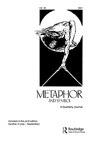Weaponization: Ubiquity and Metaphorical Meaningfulness
IF 3.3
3区 文学
0 LANGUAGE & LINGUISTICS
引用次数: 2
Abstract
ABSTRACT Conceptual metaphor theory implies that ubiquitous metaphors become mere descriptions or concepts if they are not embedded in competing discursive communities. This paper demonstrates that weaponiz- retained its meaningfulness after becoming ubiquitous despite being used by all sides in contemporary contentious politics. Because metaphors derive their figurativeness through tension, weaponiz- shows that temporality, or social time, can be marshaled to contrast an unpleasant “now” with a better “past.” This metaphoricity stands in contrast to the word’s conceptual origins in the Cold War defense industry as a literal description of the logistical deployment of weapons systems. As the word’s use mutated into a metaphor around 2003, it took on its contemporary moral meaning of over-politicizing things that had been, and should remain, neutral or peaceful. By 2017 “the weaponization of everything” implied that all aspects of social life were newly embroiled in illegitimate politics, making the metaphor a profound act of nostalgia that erased even recent conflicts. This paper thus adds temporal rhetorical tension as one of the ways that metaphors can retain meaningfulness through a case study of a metaphor that arose only recently, demonstrating the usefulness of diachronic analyses of novel metaphor emergence.武器化:普遍性与隐喻意义
概念隐喻理论意味着,如果普遍存在的隐喻不嵌入竞争的话语群体中,它们就会变成纯粹的描述或概念。本文表明,尽管在当代有争议的政治中各方都在使用武器,但武器化在变得普遍之后仍然具有其意义。因为隐喻是通过紧张来获得其象征性的,武器化表明,时间性或社会时间可以用来将不愉快的“现在”与更好的“过去”进行对比。这种隐喻性与该词在冷战国防工业中的概念起源形成了对比,后者是对武器系统后勤部署的字面描述。2003年左右,随着这个词的使用演变成一个隐喻,它具有了当代道德意义,即将过去和应该保持中立或和平的事物过度政治化。到2017年,“一切的武器化”意味着社会生活的各个方面都新卷入了非法政治,这使这个比喻成为一种深刻的怀旧行为,甚至抹去了最近的冲突。因此,本文通过对一个最近才出现的隐喻的个案研究,将时间修辞张力作为隐喻保持意义的方式之一,证明了对小说隐喻出现的历时分析的有用性。
本文章由计算机程序翻译,如有差异,请以英文原文为准。
求助全文
约1分钟内获得全文
求助全文
来源期刊

Metaphor and Symbol
Multiple-
CiteScore
2.90
自引率
0.00%
发文量
23
期刊介绍:
Metaphor and Symbol: A Quarterly Journal is an innovative, multidisciplinary journal dedicated to the study of metaphor and other figurative devices in language (e.g., metonymy, irony) and other expressive forms (e.g., gesture and bodily actions, artworks, music, multimodal media). The journal is interested in original, empirical, and theoretical research that incorporates psychological experimental studies, linguistic and corpus linguistic studies, cross-cultural/linguistic comparisons, computational modeling, philosophical analyzes, and literary/artistic interpretations. A common theme connecting published work in the journal is the examination of the interface of figurative language and expression with cognitive, bodily, and cultural experience; hence, the journal''s international editorial board is composed of scholars and experts in the fields of psychology, linguistics, philosophy, computer science, literature, and media studies.
 求助内容:
求助内容: 应助结果提醒方式:
应助结果提醒方式:


